Opinion: Jill Biden and Duchess of Cambridge urge change in early childhood education
There have, however, been reasons for hope and optimism as well during this time. In the United States and United Kingdom alike, the disruption of the pandemic has helped us focus on the things that matter most. Having been kept apart, we all value our connection to our families and loved ones in a much deeper way.
We also have allowed ourselves to think differently about the future, and what we want for our children. The two of us met on Friday in Cornwall, gathering early childhood education experts from both of our countries together in the southwesternmost corner of the UK as the leaders of the G7 nations met in person for the first time since the pandemic began. These countries are united in the view that we should look to not just build our nations back to where they were before the pandemic, but that we should be ambitious in our vision and plan a stronger future.
We both believe that part of this vision for the future must include a fundamental shift in how our countries approach the earliest years of life. If we care about how children perform at school, how they succeed in their careers when they are older, and about their lifelong mental and physical health, then we have to care about how we are nurturing their brains, their experiences and relationships in the early years before school.
This issue should matter to parents and non-parents alike. We can all do our part by valuing the role of mothers, fathers and caregivers. If we want strong economies and strong societies, we need to make sure that those raising and caring for children get the support they need.
We can all make sure that the parents in our lives — the young couple who lives next door, the single mother or father we work with or the brother or sister raising their first child — feel valued, supported, and cared for. We also need to value those who work with babies and young children; they play an essential part in the future of our communities.
The two of us believe that early childhood care and education should be seen as among the defining, strategic issues of our time. What would happen if we really followed the science of early childhood and started focusing on the things that would make the biggest difference for children and those who guide them? We could transform the prospects of an entire generation.
This is an agenda that should unite us all. We must have new conversations in our families and communities. We need CEOs to consider how they support the parents and caregivers in their workforces. And we need leaders across the world to understand that early childhood care and education is where they can make some of the most important, long-term impacts for their nations.
We both have work to do in our own countries, but we also hope that we can work together across borders and oceans on how to elevate the importance of early care and learning for children. We should undertake new, international research projects and highlight the most successful, innovative examples of early years interventions that we can all share and learn from.
As we look to a post-pandemic future, there are few issues more worthy of our attention than the transformative power of early childhood care and education for our communities and nations. We look forward to championing this work in the years to come.
![]()


